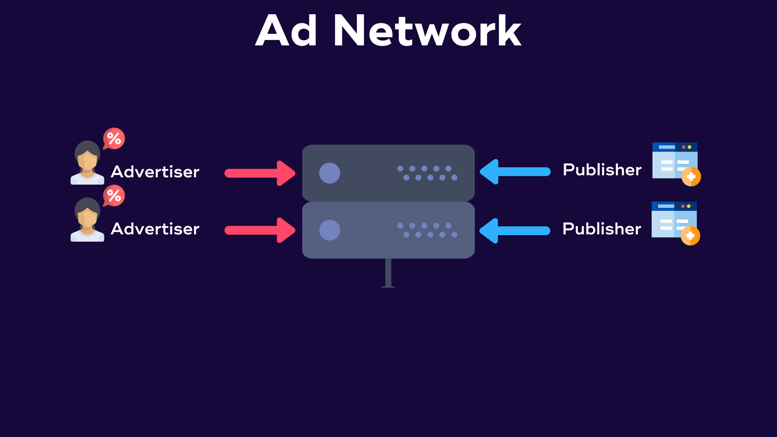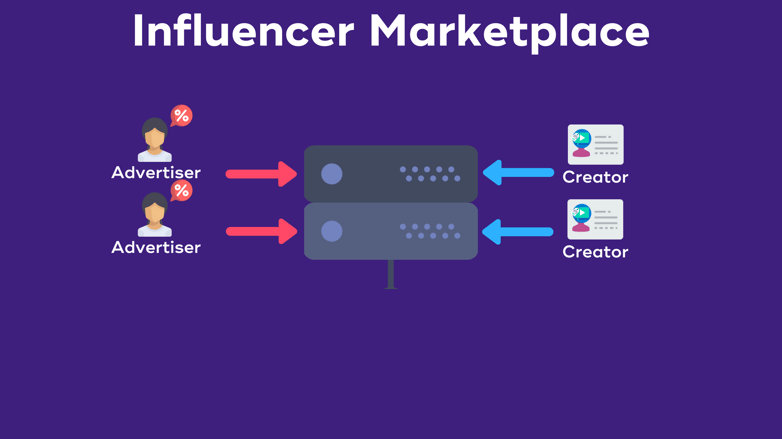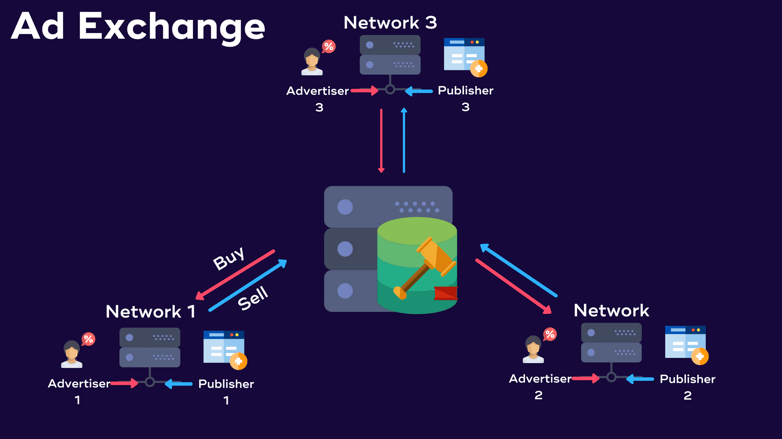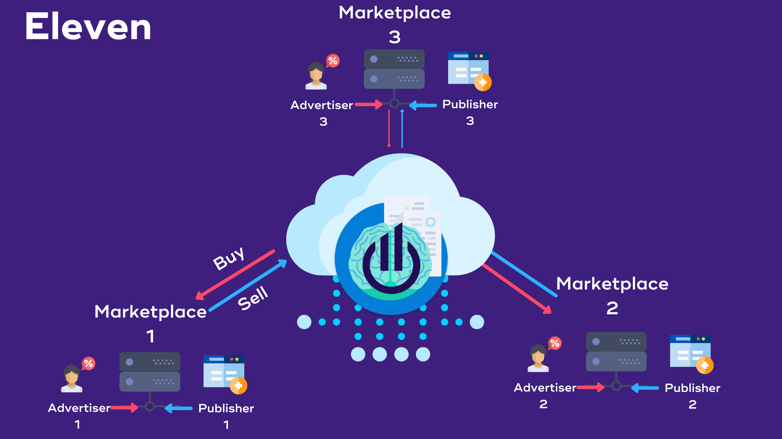How Eleven Differs from Influencer Marketplaces.
To truly comprehend the difference between Eleven and influencer marketplaces, you should first understand the difference between Ad Networks and Ad Exchanges.
Eleven differs from influencer marketplaces similarly to how Ad Exchanges differ from Ad Networks.
Where Ad Exchanges displaced Ad Networks, Eleven’s taken great caution in building a system from which the entire industry can benefit. Our entire business model revolves around mutually beneficial business. We sum it up as “Community Matters” and it’s been our motto since Day 1.
What is an Ad Network:
Ad Network:
An Ad Network is an online arbitrage platform that aggregates publishers’ inventory, segments it by geographical location, age, gender, etc., and sells slices of it to advertisers/agencies. It’s sort of a controlled marketplace between buyers (advertisers) and sellers (publishers). Ad Networks work as brokers for both sellers and buyers. Within an Ad Network, an advertiser can buy space on a single site or on multiple sites across the entire network.
Example: Google’s AdSense, Yahoo Publisher Network,
Eleven treats influencer marketplaces like Ad Networks, as they are essentially the same thing.
What is an Ad Exhchange?
Ad Exchange / Exchange
An Ad Exchange is a technology platform that facilitates the buying and selling of media advertising inventory from multiple Ad Networks. Prices for the inventory are determined through bidding. The approach is technology-driven, as opposed to the historical approach of negotiating prices on media inventory.
See how this works out? Eleven basically allows for publishers to bid on inventory available across all participating networks, both private and open marketplaces.
How are ad exchanges different from ad networks?
There are a few major differences between Ad Exchanges and Ad Networks. Below, you’ll see the traditional differences in italics, as well as Eleven’s approach:
On Ad Exchanges, ads are sold one impression at a time, often in real-time, whereas Ad Networks tend to sell them in bulk. Although programmatic direct transactions (defined below) blur the lines a bit, generally, Ad Exchanges maximize the value and efficiency of each available ad unit compared to Ad Networks.
Automated Guaranteed (programmatic direct) :
Automated Guaranteed, also known as Programmatic Direct, is advertising where the inventory is reserved and the price is fixed. Essentially, it’s like old school ad buying, except instead of people making deals over three-martini lunches, now robots make the deals without the drinks and the chitchat. The RFP and campaign routing process is automated, and the deals are negotiated directly through API calls. To date, Automated Guaranteed spending has been a small part of overall programmatic spending, but the growth potential is huge.
Eleven sells 100% opt-in attention, not impressions; we also sell them one at a time. We do this via what’s called an automatic guarantee, where guaranteed attention (e.g., viewership, listens, engagement, etc.) is sold on Fixed CPM. Attention, or viewership, is inventory on Eleven. If you’re interested in the proposed models for engagement and listens for podcasts, let us know!
The RFP and campaign routing process is automated and the deals are negotiated directly through API calls, between both traditional ad tech and influencer marketplaces. Our system actually mirrors a traditional Ad Exchange from a technical standpoint, but the use cases are specifically tailored to flow between the entertainment industry as publishers.
"You ever hear Gary Vee say he's "day trading attention"?
We do that, but literally."
We sell via automatic guarantee, whereas marketplaces don’t sell inventory at all. They sell access to the publishers, and you’re left to negotiate your own arrangements. Essentially, you buy everything “in bulk”, from views to engagement. And it’s all in bulk when you’re buying talent.
"Ad exchanges offer more transparency. An advertiser bidding on an exchange will have visibility into the site, the ad unit, and the audience they’re bidding on. In contrast, because ad networks transact mainly in bulk, they offer much less visibility into that information.
Ad networks are essentially middlemen between advertisers and publishers."
Eleven provides transparency for the entire space. We provide insights into the content, creators, cultures, and communities being bid on... which is actually 90% of our methodology. “Buying in bulk” means you’re buying everything via the influencer, from views to engagement to conversions. The issue is you never really know how much you’re going to get out of what, who’s watching/engaging, or what the impact is at the end of the day. It’s the nature of talent.
It wouldn’t be fair to say influencer marketplaces haven’t done anything to provide insights, as some of them are pretty informative. The better ones provide some follow through with campaign management and the like, but their role usually stops at completing the transaction. This blurred line is adjacent to the blurred line between a DSP and an Ad Exchange.
It’s important to note that this is no fault of their own. These are influencer marketplaces, where the publishers set their own pricing. Remember when this new category of publishers, or influencers, had nothing to actually sell? It was chaotic for a while! People came up with various formulas for pricing, like cost per engagement, per reach, per post, and more, but a core price metric had yet to be agreed upon across the board at the marketplace level. As far as the influencer marketplaces are concerned, pricing isn’t their call.
Eleven’s approach is different – we’re taking that leap.
We’re stating that the core price metric is attention. Attention can come in many ways, be it views, listens, or engagement. We must set a standard if we intend to move into a more sophisticated system as a unit.
So, everything is priced on a CPx. Eleven’s Alpha CPx is CPV, or cost per view. We’ll be rolling out cost per listens for podcasts soon, as well as cost per engagement, which should be especially helpful for platforms like Live.ly or content that involves live streaming in some form.
In the meantime, we’re inviting podcasters into the system and helping them make the shift into cross platform broadcasting by pitching ideas for original shows to be funded in the near future.
Are ad networks still relevant in this age of programmatic?
While ad networks don’t offer the same targeting sophistication that ad exchanges do, they can still be a simple, efficient way to scale your media buy across a large number of publishers. Although more advertising spend is moving towards programmatic channels, ad networks won’t disappear anytime soon.
Will influencer marketplaces be relevant in the future?
Yes, Marketplaces are still a great place to shop around for influencers, and they all have their own bells and whistles. They are still really great for one off's or small batch influencer campaigns, especially for brands on a budget that need a quick bump. While Some of them do allow some scalability in terms of managing the campaigns, especially SaaS platforms and Managed Services, but fall short arriving to a decision as to how the money spent on those campaigns will affect your overall strategy, and dealflow is limited to those ecosystems.
For that reason, it’s difficult to convince a media buyer to take their traditional media budgets and shift it into branded content.
Eleven’s solving that issue for the entire space by siphoning the traditional media budgets and distributing them back into those platforms.
We’re basically building the framework to allow programmatic buying and selling from any and every platform by simply modeling the engine behind the programmatic guarantee; it translates into the influencer mar-tech space, and positions them as the go-to source to spend the ad budget via a programmatic guarantee (powered by Eleven) on Grapevine and Famebit, as opposed to Google and Facebook.
Posts by Topic
- Branded Entertainment (9)
- Branded Content (6)
- Influencer Marketplaces (4)
- media planning (4)
- Ad tech (3)
- Programmatic Advertising (3)
- Use Cases (3)
- ad networks (3)
- media buying (3)
- Capabilities (2)
- DMP (2)
- Eleven Academy (2)
- Premium Content (2)
- programmatic influencer marketing (2)
- 100% Opt-In (1)
- American Gods (1)
- Cost Per View (1)
- Creators (1)
- DSP (1)
- Digital Talent (1)
- Eleven Digital (1)
- Entertainment (1)
- Heineken (1)
- Influencers (1)
- Methodology (1)
- Music (1)
- SSP (1)
- Talent Agent (1)
- Talent Manager (1)
- Vendors (1)
- advertising (1)
- brand safety (1)
- culture (1)
- diversity in advertsing and entertainment (1)
- eleven vs influencer marketplaces (1)
- influencer marketing (1)
- prospecting (1)
- retartgeting (1)







.png)